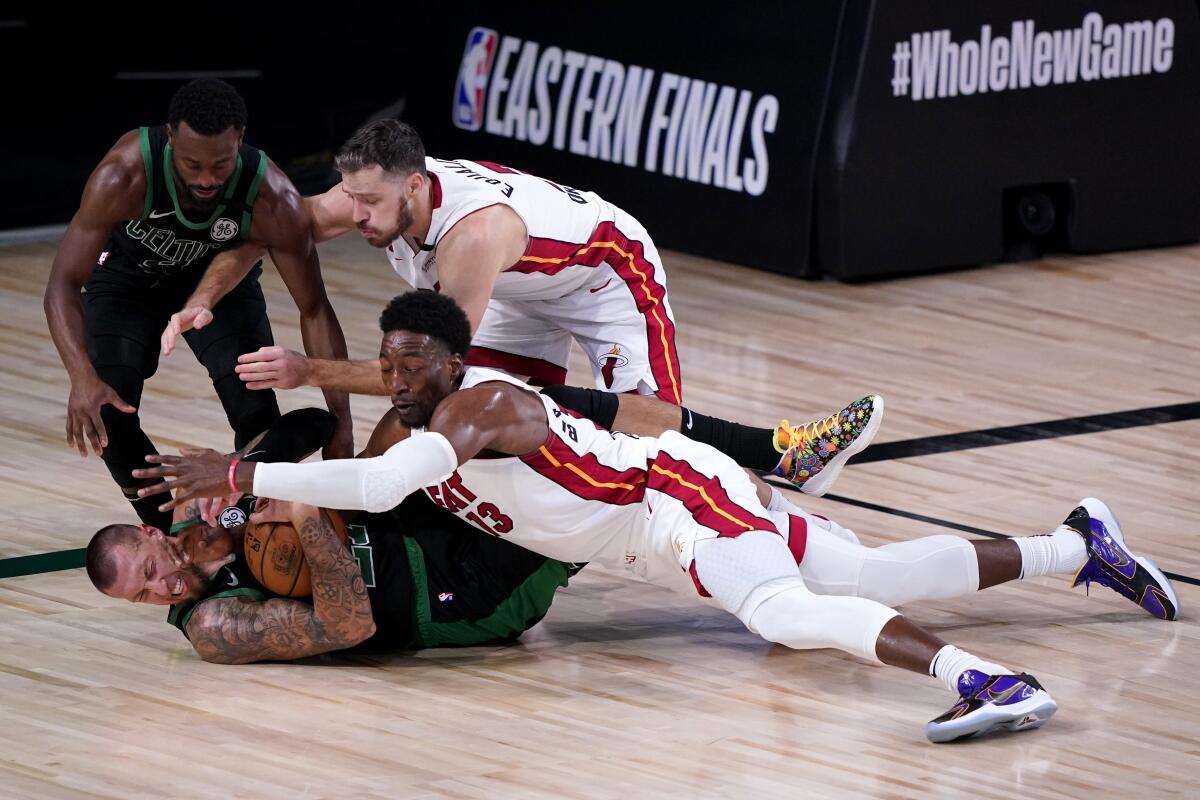Substance over style serves Heat well in Game 2 win over Celtics

- Share via
ORLANDO, Fla. — There were huge plays that helped Miami come back to beat Boston on Thursday, the moments that seem like the difference between 2-0 and 1-1 were dramatic.
There was Jimmy Butler, in the middle of a horrendous offensive night, tipping a pass and saving the ball, swinging it behind his back to trigger a fastbreak that ended with a Butler dunk late in the fourth. There was Goran Dragic stepping back and hitting two jump shots as the clock wound down.
And before that, in the third, it was Bam Adebayo pushing loose for easy dunks and Jae Crowder whipping around a screen to hit a three-point shot to go with the foul, a play that helped push the Heat comeback over the hump.
Undeniably, these were the signature moments that pushed the Heat to a 106-101 win in Game 2 of the Eastern Conference finals.
But the Heat are more substance than style, so looking at the flashiest plays can hide the truth. And the truth Thursday was a fairly shrug-worthy four straight points to end the first half made all the difference.
Guard Jamal Murray has helped Denver reach its first Western Conference finals since 2009 with his scoring, playmaking and leadership.
The two buckets — a jumper from Dragic and a drive from Butler — came during a stretch where the Heat stopped Boston on four straight possessions, the foundation on which runs can be built and momentum can be turned.
“We felt a little bit better. It felt like we were down 30 and we looked up, and it was 13,” Heat coach Erik Spoelstra said. “It was like, ‘OK, let’s see if we can get control of this game.’
Calling it a run doesn’t seem right — a 4-0 stretch is more like the first steps out of the starting blocks — but the stretch cut the Boston lead from 17 to 13. And those final 90 seconds in the first half gave the Heat the psychological ammunition to pull off another wild bubble comeback and grab control of the series.
“It’s huge,” Heat guard Duncan Robinson told The Times. “We had a conversation about that at halftime. Thirteen is manageable. It’s not that 17 isn’t … but we talked about it. Thirteen is just significantly more manageable.”
Miami outscored Boston by 20 in the third quarter, setting up Butler and Dragic to seal the win late. The frustration in the Celtics’ locker room actually spilled into the hallway, where multiple reporters heard Marcus Smart screaming from behind the team’s door.

Highlights from the Miami Heat’s win over the Boston Celtics in Game 2 on Thursday.
“Guys were emotional after a hard game, hard loss,” Boston coach Brad Stevens said.
The Celtics aren’t the first team to be flummoxed by the Heat. Butler himself said that if the games were judged by which team was more talented, Boston would have the edge.
But Miami is two wins from the NBA Finals after going 10-1 this postseason, the best record of any team in these playoffs. Truly a team where the collective is stronger than the individuals alone, the Heat showed Thursday they are going to be a problem every time they play.
Of the seven players who played 10 or more minutes, each made at least one play that could be directly attributed to the win, ranging from a wild banked-in three-point shot from Kelly Olynyk to rookie guard Tyler Herro’s nine rebounds.
It wasn’t perfect, but it was enough.
“We look each other in the eye and tell each other when it’s B.S. … because it’s unacceptable,” Butler said. “We know when we’re not playing the way that we’re supposed to be playing. And as bad as it sounds, it’s like a switch. It just turns on, and, ‘Oh, there we go right there.’ I’m telling you, straight face communication, move on and get it done.”
Guard Jamal Murray has helped Denver reach its first Western Conference finals since 2009 with his scoring, playmaking and leadership.
Even Spoelstra’s decision to move the Heat into a zone more in the second half gave the Celtics problems.
But Miami’s culture refuses for any of those things to be the reason they’re up 2-0. The shared threads pulling everyone toward winning, an organizational refrain, has everyone on board with what it’s going to take.
“I know everybody wants to talk about a scheme,” Spoelstra said, “but for us it’s disposition, effort, making multiple plays and multiple efforts, regardless of the scheme.”
Down 17, the Heat hadn’t found that. But one stop, then another, then another and then another — it all changed.
“It was [the foundation],” Robinson said. “In games like this, you have to capitalize on any sort of momentum you can capture. ... Really, it’s just having the mental stability to push through.”
More to Read
Go beyond the scoreboard
Get the latest on L.A.'s teams in the daily Sports Report newsletter.
You may occasionally receive promotional content from the Los Angeles Times.












